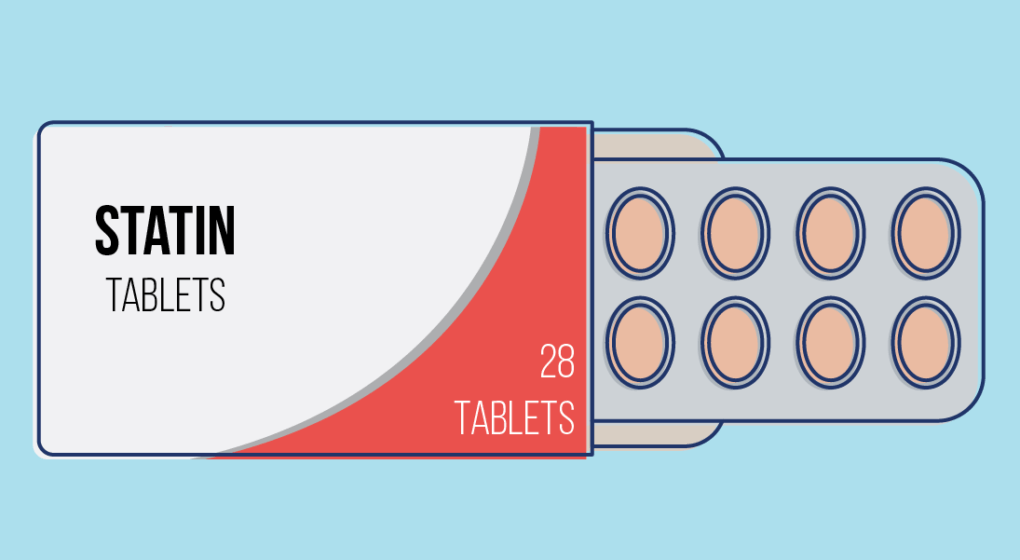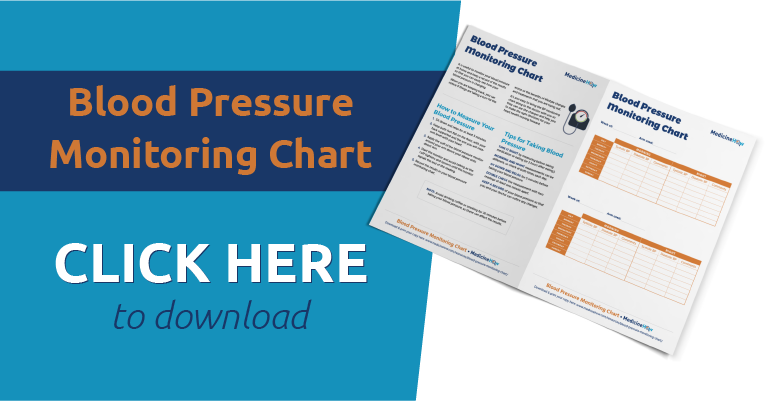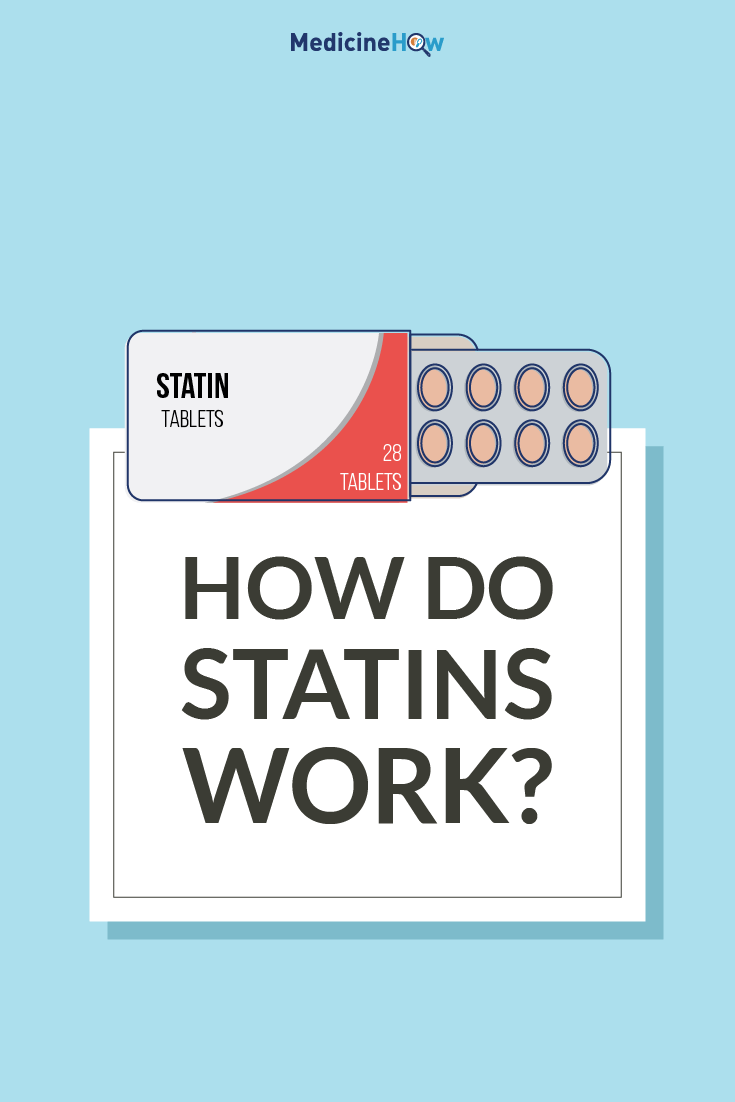
Statins are a class of drugs that all work in a similar way to control the level of cholesterol in your blood. Each of the drugs in this class inhibits an enzyme in the body that is needed to produce cholesterol and lead to a reduction in the unhealthy LDL cholesterol.
What are Statins used for?
![]() Statins are the most effective drugs currently available to lower the LDL cholesterol in the blood and can usually reduce the LDL concentration by 30% to 50%. They can also help to reduce triglyceride and increase HDL cholesterol concentrations slightly. As a result, if you have a high risk of cardiovascular disease, a statin drug can reduce your risk of suffering from a myocardial infarction, stroke, revascularization procedures,and death.
Statins are the most effective drugs currently available to lower the LDL cholesterol in the blood and can usually reduce the LDL concentration by 30% to 50%. They can also help to reduce triglyceride and increase HDL cholesterol concentrations slightly. As a result, if you have a high risk of cardiovascular disease, a statin drug can reduce your risk of suffering from a myocardial infarction, stroke, revascularization procedures,and death.
There are several reasons that your doctor might recommend a statin drug for you. It might be because you have:
- High levels of cholesterol in your blood (hypercholesteraemia)
- High levels of triglycerides and cholesterol in your blood (mixed hyperlipidaemia)
- A high risk of CHD (with or without abnormal cholesterol)
However, statins should only be used in combination with diet and lifestyle alterations and not as a substitute for healthy living choices.

Examples of Statin Drugs
![]() There are several drugs that are classed as statins because they work in the same way to control blood cholesterol. They include:
There are several drugs that are classed as statins because they work in the same way to control blood cholesterol. They include:
- Atorvastatin (doses: 5 mg, 10mg, 20 mg, 40 mg, 80 mg)
- Fluvastatin (doses: 20 mg, 40 mg, 80 mg)
- Pravastatin (doses: 20 mg, 40 mg, 80 mg)
- Rosuvastatin (doses: 5 mg, 10mg, 20 mg, 40 mg)
- Simvastatin (doses: 5 mg, 10mg, 20 mg, 40 mg, 80 mg)
No matter which statin drug you take, it is usually best to start with a lower dose and gradually increase the dose each month to reach the optimal dose in your body to reduce the LDL cholesterol. This is important because it allows your body time to adjust to the dose and you are less likely to take a dose too high for you and experience side effects.
What is the difference between statin drugs?
![]() Each of the statin drugs works in the same way in your body. However, there are slight differences in their effect on the cholesterol and the way they are processed in your body.
Each of the statin drugs works in the same way in your body. However, there are slight differences in their effect on the cholesterol and the way they are processed in your body.
How well they work
The most effective drugs to reduce LDL cholesterol and atorvastatin, rosuvastatin, simvastatin. The least effective statin drugs to reduce LDL cholesterol are fluvastatin and pravastatin.
Drug Interactions
Most statin drugs are metabolized in the liver by enzymes that are also involved in the metabolism of other drugs. This means that they can interact with each other and there is an increased risk of side effects. Fluvastatin, pravastatin, and rosuvastatin tend to interact with other drugs less often than atorvastatin or simvastatin.
Time of Dose
It is best to take a dose of simvastatin, fluvastatin or pravastatin at nighttime because the drug is more effective when taken at this time. However, atorvastatin and rosuvastatin are not affected by this and can be taken at any time.
How do Statins work?
![]() Statins work to reduce the level of LDL cholesterol in your blood by changing the way that cholesterol is produced in your body.
Statins work to reduce the level of LDL cholesterol in your blood by changing the way that cholesterol is produced in your body.
Usually, an enzyme called 3-hydroxy-3-methylglutaryl coenzyme A (HMG-CoA) reductase is needed in the reaction to synthesize cholesterol in the body.
Statin drugs competitively inhibit this enzyme, which reduces the rate that cholesterol can be produced and the concentration in the body decreases.
Additionally, statin drugs can also increase the uptake of cholesterol from the blood in the liver. This means that they cause more cholesterol to be taken out of the blood and to be broken down in the liver, further reducing the LDL and triglycerides.
Side Effects
![]() Statins are usually well tolerated, although some people do experience side effects when they take a drug in this class. You may notice:
Statins are usually well tolerated, although some people do experience side effects when they take a drug in this class. You may notice:
- Muscle pain (myopathy)
- Nausea, diarrhea or vomiting
- Headache
- Insomnia
- Dizziness
- Elevated levels of aminotransferase in the body (dose related)
Rarely, some people have severe muscle pain called myopathy or rhabdomyolysis. This is most common when the dose is too high, there is an interaction with another drug that increases the risk of these conditions or another associated illness.
In almost all patients that experience side effects, the statin dose is too high.
If you take a statin drug, it is important for you to be aware of the side effects so that you can recognize the signs and talk to your doctor about decreasing the dose, if needed.
Precautions
![]() For some people, statin drugs may not be the best drug choice because of the particular effects it may have.
For some people, statin drugs may not be the best drug choice because of the particular effects it may have.
If you have severe trauma, infection or metabolic disease, there is an increased risk of side effects and complications such as myopathy, rhabdomyolysis, and renal failure. Your doctor may advise you to stop taking the statin drug during this time, and you can begin to take it again when you recover.
Side effects, particularly myopathy and rhabdomyolysis, are more likely if you have poor renal function, which is often a natural part of aging.

Pregnancy and Breastfeeding
![]() Statins are contraindicated during pregnancy. When used during the first trimester of pregnancy, there is an increased risk of fetal malformation. If you are a woman of childbearing age and are taking a statin, it is important that you use adequate contraception to avoid an unexpected pregnancy and talk to your doctor about your medication before trying to conceive.
Statins are contraindicated during pregnancy. When used during the first trimester of pregnancy, there is an increased risk of fetal malformation. If you are a woman of childbearing age and are taking a statin, it is important that you use adequate contraception to avoid an unexpected pregnancy and talk to your doctor about your medication before trying to conceive.
Statins are also not recommended for women who are breastfeeding due to the effect they could have on the baby.
Pin it!


